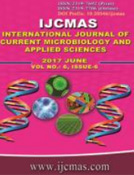


 National Academy of Agricultural Sciences (NAAS)
National Academy of Agricultural Sciences (NAAS)

|
PRINT ISSN : 2319-7692
Online ISSN : 2319-7706 Issues : 12 per year Publisher : Excellent Publishers Email : editorijcmas@gmail.com / submit@ijcmas.com Editor-in-chief: Dr.M.Prakash Index Copernicus ICV 2018: 95.39 NAAS RATING 2020: 5.38 |
The last two decades have witnessed extensive research on potential and observed vulnerability to climate change on all kinds of natural and social systems. Vulnerability depends critically on context, and the factors that make a system vulnerable to a hazard will depend on the nature of the system and the type of hazard in question. Thus, a clear description of the vulnerable situation is an important first step for avoiding misunderstandings around vulnerability. The assessment of vulnerability in the context of extreme climate events and historical climate variability is an important avenue for engaging the policy community. A focus on climate variability automatically brings to the fore the way in which socio-economic systems becomes vulnerable to climate hazards. At the same time, this analysis provides insights that are relevant immediately to deal with extreme climate events well before the full range of consequences of mean changes in the climate state become apparent. Therefore, improved understanding of vulnerability and adaptive capacity is essential for identifying and realizing the full benefits of developmental projects, and in ensuring that such projects, particularly infrastructure projects, do not lead to mal adaptation with regard to future climate change. With this background, the present study extensively reviewed the different concepts, definitions and terminologies used to describe vulnerability, its linkages to climate change and emphasized on existing and required policy formulation to cope with the adverse impacts of climate change and variability on environmental and human systems.
 |
 |
 |
 |
 |